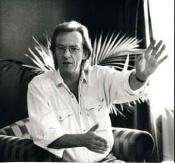Hos Renée Chardier,
i byn St-Jean-de-Luz,
vid foten av Pyrenèerna,
brinner jämt ett ljus.
Hon har tänt det en gång
och hon håller det vid liv
tills man skriver henne och lämnar bud
att jag gått min sista strid.
Hos Renée Chardier
kan jag alltid finna tröst.
Och om hon anser att jag förtjäner det
får jag plats vid hennes bröst.
Men hon ställer krav
På mitt mod och min konsekvens,
och på min trofasthet mot dom ideal
jag haft när ljuset tänts.
För hon har stridit själv,
hon har kämpat själv.
Hon har mist sin man I ett krig.
Sina söner sänder hon från land till land,
varhelst hon ser en helig strid.
Hos Renée Chardier
får jag vin på Första Maj.
Och om kvällen ber hon om sångerna
som bor I min gitarr.
Hos Renée Chardier
får jag kraft att stå emot.
För Renée Chardier är som livet självt
där det flyter fram I mitt blod.
i byn St-Jean-de-Luz,
vid foten av Pyrenèerna,
brinner jämt ett ljus.
Hon har tänt det en gång
och hon håller det vid liv
tills man skriver henne och lämnar bud
att jag gått min sista strid.
Hos Renée Chardier
kan jag alltid finna tröst.
Och om hon anser att jag förtjäner det
får jag plats vid hennes bröst.
Men hon ställer krav
På mitt mod och min konsekvens,
och på min trofasthet mot dom ideal
jag haft när ljuset tänts.
För hon har stridit själv,
hon har kämpat själv.
Hon har mist sin man I ett krig.
Sina söner sänder hon från land till land,
varhelst hon ser en helig strid.
Hos Renée Chardier
får jag vin på Första Maj.
Och om kvällen ber hon om sångerna
som bor I min gitarr.
Hos Renée Chardier
får jag kraft att stå emot.
För Renée Chardier är som livet självt
där det flyter fram I mitt blod.
Contributed by Ceil Herman - 2018/10/24 - 21:10
Saint-Jean-de-Luz, or Donibane Lohizune, referred to in the songtext, is a commune in the French Basque Country and a place known for »the sugar-and-egg-white macaroon (https://en.wikipedia.org/wiki/Macaroon) offered to Louis XIV and his young bride, the Spanish princess María Theresa, on their wedding day, May 8, 1660, in Saint-Jean-de-Luz. Ever since, the macaroon has been a specialty of that Basque port at the mouth of the Nivelle.« (Mark Kurlansky, The Basque History of the World)
Juha Rämö - 2018/10/25 - 14:56
Language: English
English translation by Ceil Herman
RENÉE CHARDIER
At the house of Renée Chardier,
in the city of St-Jean-de-Luz,
at the foot of the Pyrenees,
a light is burning.
She has lit it once
and she keeps it alive
until one writes her and leaves a message
that I have gone to my last battle.
At the house of Renée Chardier
I can always find comfort.
And if she sees that I deserve it
I have a place at her breast.
But she makes demands
on my courage and my consistency,
and on my faithfulness towards the ideals
I have when the light is lit.
Because she has battled herself,
she has fought herself.
She has lost her husband in a war.
She sends her sons from land to land,
where ever she sees a holy battle.
At the house of Renée Chardier
I get wine on the First of May.
And in the evening she requests the songs
which live in my guitar.
At the house of Renée Chardier
I get strength to resist.
Because Renée Chardier is like life itself
where it flows forth in my blood.
At the house of Renée Chardier,
in the city of St-Jean-de-Luz,
at the foot of the Pyrenees,
a light is burning.
She has lit it once
and she keeps it alive
until one writes her and leaves a message
that I have gone to my last battle.
At the house of Renée Chardier
I can always find comfort.
And if she sees that I deserve it
I have a place at her breast.
But she makes demands
on my courage and my consistency,
and on my faithfulness towards the ideals
I have when the light is lit.
Because she has battled herself,
she has fought herself.
She has lost her husband in a war.
She sends her sons from land to land,
where ever she sees a holy battle.
At the house of Renée Chardier
I get wine on the First of May.
And in the evening she requests the songs
which live in my guitar.
At the house of Renée Chardier
I get strength to resist.
Because Renée Chardier is like life itself
where it flows forth in my blood.
Contributed by Ceil Herman - 2018/10/25 - 17:00
Language: Finnish
Traduzione finlandese / Finnish translation / Traduction finnoise / Finsk översättning / Suomennos: Juha Rämö
RENÉE CHARDIER
Renée Chardierin luona
kylässä nimeltä Saint-Jean-de-Luz *)
Pyreneiden juurella
palaa aina kynttilä.
Hän sytytti sen kerran
ja pitää sitä elossa
siihen asti, kun kirje on tuonut tiedon,
että olen käynyt viimeisen taisteluni.
Renée Chardierin luona
voin ainaa löytää lohdun.
Ja jos hän arvelee, että olen sen ansainnut,
minulla on paikka hänen rintaansa vasten.
Mutta hän asettaa vaatimuksia
rohkeudelleni ja johdonmukaisuudelleni
ja uskollisuudelleni niille ihanteille,
jotka minulla oli, kun kynttilä syttyi.
Sillä hän on itse taistellut,
kamppailut itse.
Hän on menettänyt miehensä sodassa.
Poikiaan hän lähettää maasta toiseen,
aina sinne, missä hän näkee pyhän taistelun.
Renée Chardierin luona
saan viiniä vapunpäivänä.
Ja iltaisin hän pyytää lauluja,
jotka asuvat kitarassani.
Renée Chardierin luona
saan voimaa panna vastaan.
Sillä Renée Chardier on kuin itse elämä,
joka virtaa suonissani.
Renée Chardierin luona
kylässä nimeltä Saint-Jean-de-Luz *)
Pyreneiden juurella
palaa aina kynttilä.
Hän sytytti sen kerran
ja pitää sitä elossa
siihen asti, kun kirje on tuonut tiedon,
että olen käynyt viimeisen taisteluni.
Renée Chardierin luona
voin ainaa löytää lohdun.
Ja jos hän arvelee, että olen sen ansainnut,
minulla on paikka hänen rintaansa vasten.
Mutta hän asettaa vaatimuksia
rohkeudelleni ja johdonmukaisuudelleni
ja uskollisuudelleni niille ihanteille,
jotka minulla oli, kun kynttilä syttyi.
Sillä hän on itse taistellut,
kamppailut itse.
Hän on menettänyt miehensä sodassa.
Poikiaan hän lähettää maasta toiseen,
aina sinne, missä hän näkee pyhän taistelun.
Renée Chardierin luona
saan viiniä vapunpäivänä.
Ja iltaisin hän pyytää lauluja,
jotka asuvat kitarassani.
Renée Chardierin luona
saan voimaa panna vastaan.
Sillä Renée Chardier on kuin itse elämä,
joka virtaa suonissani.
* ) Saint-Jean-de-Luz on Biskajanlahden pohjukassa Ranskan Pohjoisella Baskimaalla sijaitseva 14 000 asukkaan kunta ja satamakaupunki, jonka baskinkielinen nimi on Donibane Lohizune. Mark Kurlansky kirjoittaa kirjassaan The Basque History of the World (Baskien maailmanhistoria), että kun Ludvig XIV ja hänen nuorikkonsa espanjalainen prinsessa María Theresa vierailivat Donibane Lohizunessa hääpäivänään 8.5.1660, heille tarjottiin macaron-leivoksia. Tuosta päivästä lähtien tuo maailmankuulu leivonnainen on ollut tämän Urdazuri-joen suulla sijaitsevan baskilaisen kaupungin erikoisuus.
Contributed by Juha Rämö - 2018/10/26 - 12:02
The right French spelling is "Renée", not "Renèe". Written stress marks can't be put at random in French ("é" shows closed pronunciation, "è" open pronunciation, as in Italian: "pèsca" = peach, "pésca" = fishing); so I've changed the stress throughout introduction, lyrics and translations. Of course, it's not your fault: I saw a lot of lyrics sites show "Renèe", and many people, both in France and Italy, use only one stress mark type. This is uncorrect, however.
Riccardo Venturi - 2018/10/27 - 11:13
Merci beaucoup pour les corrections, Riccardo, de quelqu'un qui a appris le français à l'école depuis deux ans il y a cinquante ans.
Juha Rämö - 2018/10/27 - 12:08
Thanks for your corrections, Ricardo. I had no idea that the accent was wrong. I want these songs of Björn Afzelius to be correct. His work means a great deal to me.
Ceil Herman - 2018/10/28 - 23:14
Merci à tous les deux, Ceil and Juha. Je vous demande pardon si je suis décidément tatillon à propos de l'ortographe des langues utilisées dans ce site, mais c'est un peu ma façon de respecter les auteurs et les personnages des chansons, et les histoires qui y sont racontées. C'est peut-être aussi un souvenir de mon enfance, quand on m'a mis à l'école française de l'île d'Elbe à l'âge de six ans et on m'a appris le français à force de punitions lorsque je me trompais sur un accent ou sur un mot. Ce n'était sûrement pas une méthode très pédagogique, mais elle a été vachement efficace. Blagues à part, ne m'en voulez pas, et merci encore.
Thank you both, Ceil and Juha. I apologize if I'm definitely fussy about the spelling of the languages used in this site, but it's a bit my way of showing respect to the authors and characters of the songs, and to the stories that are told in them. It may also well be a memory of my childhood, when I was put into the French school of the Island of Elba at the age of six, and I learned French by force of punishments when I made faults in accents or words. Certainly, the method wasn't based that much on pedagogical principles, but it was awfully effective. Jokes aside, please do not blame me, and thanks again!
Thank you both, Ceil and Juha. I apologize if I'm definitely fussy about the spelling of the languages used in this site, but it's a bit my way of showing respect to the authors and characters of the songs, and to the stories that are told in them. It may also well be a memory of my childhood, when I was put into the French school of the Island of Elba at the age of six, and I learned French by force of punishments when I made faults in accents or words. Certainly, the method wasn't based that much on pedagogical principles, but it was awfully effective. Jokes aside, please do not blame me, and thanks again!
Riccardo Venturi - 2018/10/29 - 00:28
Funny that you mentioned learning French by punishment. My experience is exactly the opposite, i.e. learning by gentleness. I learned French for two years at the upper secondary school. Our teacher, an amicable young woman, was well aware of the fact that two years with an hour and a half a week was not enough to work wonders. Therefore, she chose another path. Besides and instead of grammar and things she taught us French songs most of which I still know by heart. She also decided to give us a glimpse of French culture by organizing tastings of French cheese and wine which, of course, was strictly out of line. But she was brave and wise and gentle. I remember one French class when we were all nervous about a test coming up in an hour and dealing with something called Church History. She came in and in no time she had realized how things were. This is what she said: "My father is a clergyman so forget about French, take your history books and start preparing."
Juha Rämö - 2018/10/29 - 10:55
×
![]()
Note for non-Italian users: Sorry, though the interface of this website is translated into English, most commentaries and biographies are in Italian and/or in other languages like French, German, Spanish, Russian etc.






Text och musik/Lyrics and music: Björn Afzelius
Album: Don Quixote
Björn Afzelius wrote the following notes about "Renée Chardier" in his 95 Sånger (95 Songs) book:
"En sång om att alltid stå på de svagas sida. Helt enkelt."
"A song about always standing for the weakest side. Completely simple."